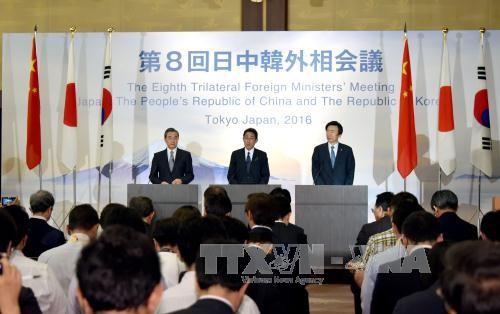(VOVworld) – Relations among China, Japan, and South Korea have been tense recently after a group of 85 Japanese lawmakers visited the Yasukuni Shrine in downtown Tokyo during the annual autumn festival. Like many previous visits, this one angered China and South Korea.
The visit by lawmakers from various political parties on October 18, one day after Prime Minister Shinzo Abe sent offerings to the shine, has provoked backlash from Beijing and Seoul.
 |
| Japanese FM Fumio Kishida (center), Chinese FM Wang Yi (left), and Korean FM Yun Byung-se at a joint press conference following a meeting Tokyo. (Photo: AFP/VNA) |
Historical differences
A spokesman for the Chinese Foreign Ministry said Beijing blasted Shinzo Abe’s offering, urging Japan to “reflect on its aggressive history and take concrete actions to win back the trust of its Asian neighbors and the international community”.
South Korea expressed deep concern and disappointment after the Japanese lawmakers visited the shrine. South Korea’s Foreign Ministry urged Japanese politicians to gain the trust of neighboring countries and the international community by showing humble introspection and sincere self-reflection based on an objective view of history.
The Yasukuni shrine is dedicated to the souls of about 2.5 million Japanese men, women, and children who died for their country in the middle of the 19th century. At the centre of the shrine controversy is the fact that the venerated souls include 14 convicted World War II war criminals, who were executed for their war crimes in 1948.
Controversy has regularly occurred whenever China and South Korea have criticized Japan for honoring war criminals. They consider Yasukuni shrine a symbol of Japanese militarism. Japanese leaders and officials’ visits to the shrine have angered Chinese and South Korean leaders and people, and anti-Japan demonstrations have occurred in both countries.
Visits to the shrine by government leaders have previously caused bitter arguments between left and right wing parties in Japan.
Fierce competition over geo-strategy
The Yasukuni shrine aside, Japan, China, and South Korea have been squabbling over territorial disputes.
Japan - China relations are strained over the Diaoyu (in Chinese) or Senkaku (in Japanese) islands, over which both claim sovereignty.
Japan and South Korea have long contested the 18-hectareTakeshima Island, known as Dokdo in South Korea. Although its economic value is slight, the island has great symbolic importance. Both countries have asserted that it is part of their territory for more than a century.
Ties between China and the Republic of Korea have been shaken up because the US, a key RoK ally, is about to deploy its Terminal High-Altitude Area Defense missile in Korean territory, uncomfortably close to China.
Cooperation remains a key trend
The three countries are competing for geopolitical influence in the region. Japan wants to project a powerful image in the region, China is proving to be the world’s strongest emerging economy, and the Republic of Korea has ironclad policies.
Above it all however, economic and trade cooperation has been buoying their relations and none of them will benefit if that cooperation ends.